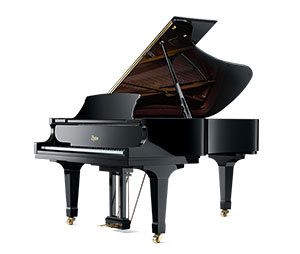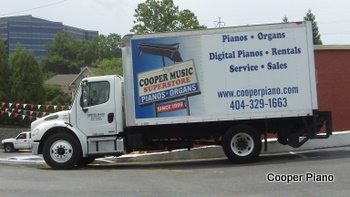There are plenty of great reasons to add a piano to your home, but unfortunately, “ease of 
Since we’d like to see your piano arrive in one piece almost as much as you, we’ve put together a quick guide to ensuring your piano moving goes as smoothly as possible. As long as you’re prepared and think ahead, you’ll be able to get your piano to its new home in one piece.
Five Tips For Successful Piano Moving
1 – Get A Large Dolly
The sight of a half-dozen men all scuttling around while carrying a piano really only happens in the movies. For all but the smallest pianos, you will need a wheeled transport of some sort to move the piano around. There are numerous reasons it’s a plain bad idea to manually carry a piano any further than is absolutely necessary. It’s just not good for the health of you or your piano.
2 – Rent A Truck
We strongly recommend renting or borrowing an enclosed truck or trailer to protect your piano as you move. Most open-top trucks are too small for most pianos, and they’re far more vulnerable to damage on the road, even if they’re properly wrapped up. An enclosed space makes absolutely sure that your piano arrives in one piece.
Also, truck rental companies can usually also supply you with the straps and wraps you need to ensure the piano is secure.
3 – Pre-Plan Your Route
The time to ask SIRI how to get to your destination is not when the piano has been loaded on the truck, especially if you’re transporting it in an open flatbed. It’s vital to verify beforehand that the route you’re taking is open, tall enough to fit the piano, and lacking any obstacles that might cause damage, such as branches along the roadside.
While not always possible, a dry run to ensure real life matches your maps is also a good idea. If you’re only moving across town, do a test drive to make sure there aren’t any surprises.
4 – Get It Tuned After You Arrive
No matter how smoothly the move goes, your piano will need tuning when it arrives. The bouncing and vibrations of being on the road are guaranteed to throw it out of tune. If possible, have a piano maintenance specialist standing by when the piano is delivered to its new home. They’ll be able to help ensure it’s placed properly within your home, as well as tuning it just as soon as it arrives.
Either way, don’t try to play until it’s been re-tuned and verified as being in good shape by a qualified piano tuner.
5 – Bring Plenty Of Help!
No one ever moved a piano on their own. No matter how it’s accomplished, you’ll need help, and lots of it. Four or five people is usually the absolute minimum for moving a large instrument, and even a small upright will need two or three.
Or, even better, call in moving specialists! Trained experts will be able to move your piano more safely and efficiently, as well as sparing you and your friends unnecessary hernias. You might be able to save money doing it yourself, but one ‘oops’ as your crew trundles it down the hall can turn into a thousand-dollar repair job.
Given how fragile pianos are – especially their legs and undersides – this is a case where “better safe than sorry” is usually a good policy. Professional piano movers can handle the job from packing to re-tuning at the end.
Have you been piano moving lately? Let us know how that went, or share your tips in the forum!








Blake, thanks for telling me that it’s best to rent a truck if you’re moving your piano to protect it during the move. My family is moving to a new house next month. We have a large antique piano, so I really appreciate your tips. I’ll try to find a piano moving service in the city that has it’s own truck for convenience purposes. Thanks.
Of course! Its best to trust the experts with a piano you love.